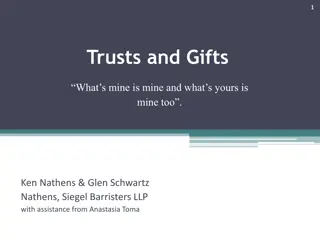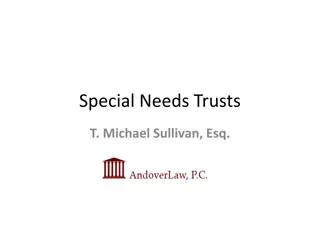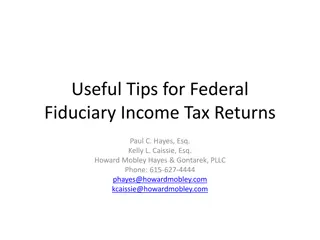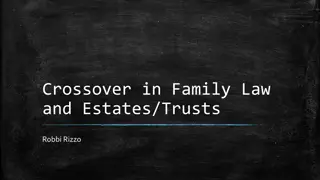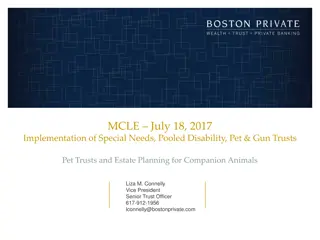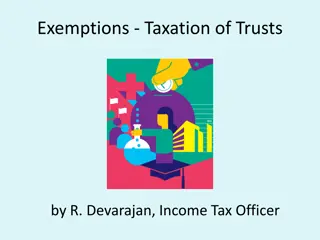Special Needs Trusts: Types, Functions, and Limitations
Special Needs Trusts (SNTs) play a crucial role in preserving eligibility for benefits like SSI, managing assets, and ensuring separation from beneficiaries. There are different types of SNTs such as Self-Settled and Pooled, each with specific guidelines and provisions. SNTs have limitations on asset usage but also offer flexibility for catering to special needs beyond basic necessities. Additionally, other planning tools like the ABLE Act provide individuals with disabilities opportunities for better financial management.
Download Presentation

Please find below an Image/Link to download the presentation.
The content on the website is provided AS IS for your information and personal use only. It may not be sold, licensed, or shared on other websites without obtaining consent from the author.If you encounter any issues during the download, it is possible that the publisher has removed the file from their server.
You are allowed to download the files provided on this website for personal or commercial use, subject to the condition that they are used lawfully. All files are the property of their respective owners.
The content on the website is provided AS IS for your information and personal use only. It may not be sold, licensed, or shared on other websites without obtaining consent from the author.
E N D
Presentation Transcript
Special Needs Trusts Tosha Rae D. Heavican, J.D. HIGHTOWER REFF LAW 10110 Nicholas Street, Suite 102 Omaha, Nebraska 68114 402.932.9550 tosha@hrlawomaha.com
SNT Functions / Structure Preserve Eligibility Consider what benefits are applicable, current and future I.e., SSI benefits Manage assets / Separation from Beneficiary Trust document Funding Trustee
Two Types of SNTs First Party Self-settled (D4A Trust) Pooled Trust (D4C Trust) Created by Others Funded by beneficiary Third Party Testamentary Stand-alone Trust Created by others Funded by others
Self-Settled SNTs 42 U.S.C. 1396p(d)(4)(a) Beneficiary is disabled under Social Security rules Beneficiary is under age 65 Trust is established by parent, grandparent, legal guardian or a court; not disabled person Irrevocable Pay-back provision Funded with the disabled person s assets Beneficiary cannot be Trustee and cannot control the trust Sole benefit on special needs
Pooled SNTs 42 U.S.C. 1396p(d)(4)(c) Trust is managed by a non-profit charity Subaccount established by a disabled person, parent, grandparent, guardian or court Payback provision to the extent funds are not retained by the trust for benefit of disabled individuals Can be used if over 65 Spend on special needs
SNTs Limitations Limitation on use of assets: i.e. food, shelter, covered medical services, cash Used for special needs Other than basic needs of food and shelter Private room Automobile/van Accounting, advocacy, legal, coordinators Non-traditional treatment or therapies Home furnishings Technology Entertainment
Other Planning Tools Achieving a Better Life Experience (ABLE) Act, Nebraska ABLE Section 529A, IRC Generally funds in these types of accounts are exempt from consideration as countable resources Basics: prior to age 26; only one account nationwide; maximum of $360,000, but only first $100,000 exempt from resource counting; maximum each year is $14,000 from all sources; tax deferred so long as used for qualified disability expenses; expenditures on non-qualified disability expenses subject to tax, penalty; subject to payback provisions Outright distribution and spend down
Questions? Tosha Rae D. Heavican, J.D. HIGHTOWER REFF LAW 10110 Nicholas Street, Suite 102 Omaha, Nebraska 68114 402.932.9550 tosha@hrlawomaha.com




